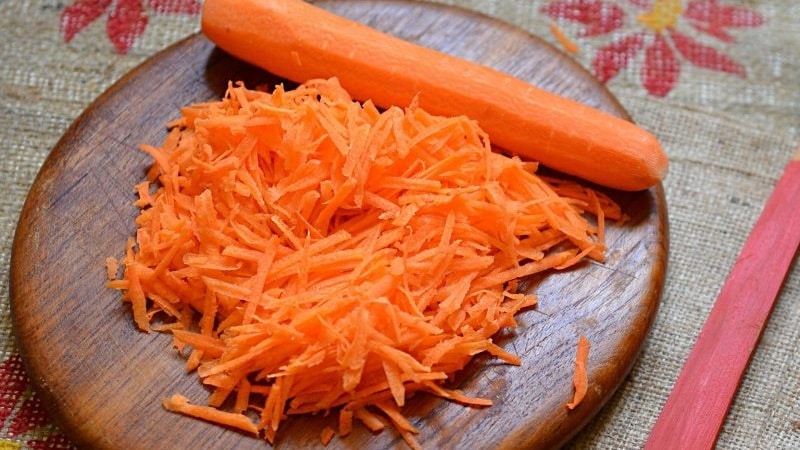Is it possible to eat carrots while breastfeeding?
Carrots are one of the healthiest vegetables, rich in carotenoids, vitamins, minerals and flavonoids. By introducing root vegetables into the diet during the postpartum period, the immune system is strengthened and overall well-being improves. However, during breastfeeding it is recommended to treat the vegetable with caution.
Useful properties of carrots
Thanks to its rich chemical composition, carrots have many beneficial effects:
- strengthens and normalizes the functioning of the cardiovascular system;
- strengthens bone tissue;
- improves the condition of the immune system;
- stimulates the functions of the gastrointestinal tract;
- prevents the development of cancer;
- maintains visual acuity;
- maintains healthy teeth and gums;
- regulates sugar and cholesterol levels;
- improves the condition of nails, hair and skin;
- accelerates regenerative processes;
- eliminates diarrhea;
- prevents inflammation of the prostate gland in men;
- has a choleretic effect, removes toxins;
- promotes the synthesis of polyunsaturated fatty acids;
- used for the prevention of hypo- and vitamin deficiencies;
- has a beneficial effect on the health of pregnant women: it reduces the symptoms of toxicosis, and is useful for the formation of the fetus.

Since carrots are a low-calorie product (35 kcal per 100 g), they are often included in the diet of people who are getting rid of from excess weight.
Carrots during lactation
The need to consume carrots during breastfeeding is due to its beneficial qualities:
- stimulates milk production;
- improves its composition, gives a pleasant aroma and taste that attracts the child;
- strengthens blood vessels and heart muscle;
- prevents the development of anemia in the baby;
- strengthens the bone skeleton of the child and mother;
- normalizes hemoglobin levels;
- improves the condition of hair, skin and teeth of a nursing woman;
- regulates weight.
When introducing carrots into the diet of a nursing woman, be sure to monitor baby's reaction: If side effects appear, postpone consumption of the vegetable for about a month.
Can a nursing mother eat carrots?
The vegetable is not on the list of foods prohibited during breastfeeding and has a lot of useful properties. Therefore, its use during lactation is not only acceptable, but also recommended.
In any form
The vegetable is introduced into the diet of a nursing woman in stages to avoid a negative reaction in the baby. It's better to start with a small piece boiled root vegetable for breakfast. If the child’s condition remains normal during the day, the amount consumed is gradually increased to 1-2 carrots per day. At first, you are allowed to eat only boiled or baked vegetables, and only after 5-6 months - raw.
Important! If you eat the root vegetable several times a week, its daily intake will be from 100 to 150 g.
It is undesirable to include several new components in the mother’s menu at once, since it will be difficult to establish the exact cause of allergy. Carrots during breastfeeding should be of high quality, without nitrates. It’s good if it is grown on your own plot. If this is not possible, it is better to buy vegetables from trusted suppliers or at farmers' markets.
Consumption of carrots depending on the feeding period
The daily amount of vegetables consumed depends on the age of the baby.
In the first month
During the first time after birth, the baby’s digestive system is just beginning to get used to food, so it is important for a nursing mother to correctly prepare a diet. It is better not to consume carrots for 2-3 weeks after birth, but to start introducing them from 4 weeks.
In the second
Is it possible to have raw carrots during this period? No, in the absence of side effects, it is permissible to consume the vegetable only in boiled or baked form, but the daily dose should not exceed 150 g.
On the third and fourth
Provided that the baby is absolutely healthy, a nursing woman can gradually return to her normal diet. It is important that the interval between adding each new product is at least 3 days.
Eating baked or boiled root vegetables is acceptable 3-4 times a week with a daily intake of 150 g.
Important! For breastfeeding, carrot juice diluted with water in a 1:1 ratio is allowed. At first, its daily dosage should not exceed 2 sips. Gradually this number increases.
Until the 5th month of breastfeeding, only heat-treated vegetables remain in the diet.

Rules for introducing carrots into the diet of a nursing mother
When consuming vegetables during breastfeeding, it is important to strictly adhere to the recommendations related to the start of intake, daily portions, methods of preparation and compatibility with other products.
How often to use and in what form
The frequency of eating carrots during breastfeeding is 3-4 times every 7 days. The vegetable must be boiled or baked. In this form, the bulk of vitamins and nutrients remain, reducing the risk of negative effects of the root vegetable on the baby’s digestive system.
Carrot dishes for nursing
The vegetable can be eaten not only in its pure form, but also as part of various dishes, for example:
- mashed potatoes;
- boiled salad grated vegetables;
- casserole;
- steamed vegetable cutlets;
- vegetable puree soups;
- lean stewed meat.
Dosage
When introduced into the diet, the first portion of carrots should not exceed 30 g. In the future, if the product does not cause adverse reactions in the baby, the dosage is increased to 150 g per day. Permissible frequency of use is up to 3 times a week. Daily norm juice, diluted with clean water to a concentration of 50% - 200 ml.
Cooking methods
During lactation, it is recommended to eat carrots as part of various dishes.
Important! When cooking, you should not use garlic and hot seasonings, as they can negatively affect the quality of breast milk and the health of the baby.
Cream soup with carrots and potatoes
Components:
 2 carrots;
2 carrots;- 3 potatoes;
- 1 onion;
- 600 ml chicken or vegetable broth;
- 30 g butter;
- salt.
Preparation:
- Cut the washed and peeled vegetables into small pieces.
- Melt the butter and simmer the onion in it for a while.
- Place pieces of vegetables into the broth and cook for 10–15 minutes.
- Add the onion seasoning to the soup and simmer for another 3-4 minutes.
- After cooling, grind everything in a blender.
Vegetable cream soup is best eaten with croutons.
Cream soup with cauliflower and carrots
Components:
- 2 liters of low-fat broth;
- 700 g cauliflower;
- 2 carrots;
- 4 tbsp. l. soft processed cheese.
Preparation:
- Wash and peel the vegetables.
- Disassemble the cabbage into inflorescences, cut the carrots into large slices.
- Place carrots in boiling broth and cook for about 7 minutes.
- Add cabbage to the pan and leave over medium heat for another 5-6 minutes.
- Remove the soup from the heat, cool slightly and add cheese.
- Stir the mixture and pass through a blender.
Before serving, it is recommended to decorate the dish with fresh herbs.
Salad with carrots and apples
Ingredients:
 2 carrots;
2 carrots;- 1 apple (necessarily green);
- 1 tbsp. l. olive oil;
- greenery.
Preparation:
- Wash and peel carrots and apples.
- Grate on a coarse grater.
- Add greens, season with oil and stir.
Salad is allowed for consumption from 5 months after birth.
Cheese, apple and carrot salad
Components:
- 200 g carrots;
- 50 g sour cream;
- 200 g apples;
- 50 g hard cheese;
- 30 g walnuts;
- greens (dill, parsley);
- salt.
Preparation:
- Prepare carrots and apples: wash and peel.
- Grind using a grater.
- Grate the cheese on a medium grater.
- Finely chop the washed greens.
- Chop the nuts.
- Combine all ingredients, season with sour cream and salt.
Cutlets
Components:
- 50 ml milk;
- breadcrumbs;
- 250 g carrots;
- 20 ml vegetable oil;
- 1 egg;
- 30 g flour.
Preparation:
- Wash the root vegetable, peel, cut into pieces and boil in milk mixed with butter.
- Grind until puree.
- Combine with egg and flour.
- Divide into parts and form into cutlets.
- Roll in breadcrumbs.
- Place on a baking sheet previously greased with oil.
- Bake in the oven for 30 minutes, turning to the other side every 15 minutes.

Carrot-curd casserole
Ingredients:
- ½ kg cottage cheese;
- 3 eggs;
- 150 g carrots;
- 50 g sugar;
- 100 g flour;
- 100 ml milk.
Preparation:
- Peel the carrots and grate on a medium grater.
- Combine cottage cheese with eggs and sugar, beat with a blender.
- Mix all ingredients, place on a baking sheet and bake in the oven for 30 minutes at +180°C.
Serve the finished casserole with jam or sour cream.
The right combination
Boiled carrots goes well with all vegetables. To speed up the absorption of vitamin A, it is important to consume the vegetable with a small amount of fat: sour cream, butter.
Diluted with water It is advisable to drink juice on an empty stomach (in the absence of gastritis with high acidity, inflammation of the small intestine and ulcers) 30 minutes before breakfast, which will quickly start the digestive tract.
Contraindications and safety measures
Carrots do not cause side effects, but they misuse with hepatitis B in some cases leads to complications. At a dosage of up to 1.5 kg per week, the mother's skin may turn a pronounced yellow color.
Overeating vegetables negatively affects the quality of milk, which is why babies do not want to breastfeed. To avoid such difficulties, it is important to adhere to the rules for eating root vegetables recommended by pediatricians.
Can carrots harm a baby?
Possible harm to the child from eating carrots by the mother during breastfeeding is expressed in the following:
- the occurrence of an allergic reaction, indicated by symptoms: rash, red eyes, runny nose, swelling of the face, indigestion;
- the appearance of colic due to the increased fiber content in the vegetable.
Advice from pediatricians
During lactation, experts recommend consuming carrots because of their beneficial properties. However, it is important to follow the rules:
- up to 5 months after birth - the vegetable must undergo heat treatment: boiling, stewing;
- for the 5th month - taking into account strict adherence to the dosage, it is permissible to eat fresh root vegetables.
Conclusion
Carrots are a tasty root vegetable, the chemical composition of which has a beneficial effect on the body of a nursing mother and baby.However, only with moderate consumption, the vegetable will provide health benefits and will not cause adverse reactions.